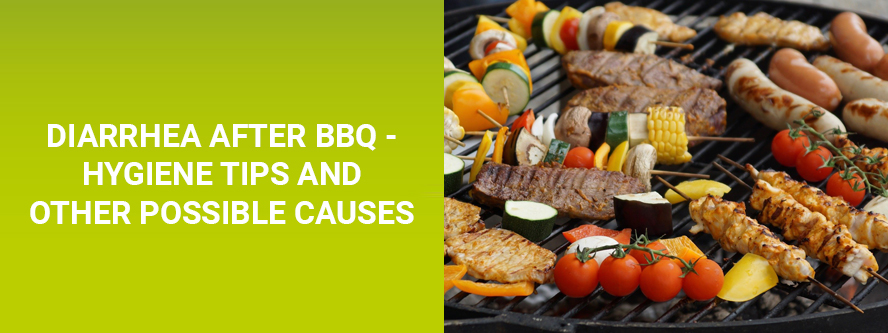Important hygiene tips when barbecuing and what else can be causing gastrointestinal complaints and diarrhea.
For many people on staycation, a cozy barbecue is an integral part of their vacation plans and they cannot wait to smell the aroma of freshly grilled meat wafting through the air. When grilling, however, you should always pay special attention to hygiene measures, because summer heat and raw meat do not get along very well. Germs multiply particularly fast in the summer and eating spoiled grilled food can lead to digestive problems. In the worst case, even a salmonella infection could be possible.
Prevention
For enjoyable and carefree summer barbecue evenings without any worries, you should heed the following hygiene tips:
- Wash your hands regularly and thoroughly.
- If possible, do not touch raw meat with your hands. Better, use a fork or barbecue tongs. This will prevent germs from spreading from your hands to other ingredients.
- Use separate knives, plates and cutting boards for the meat and the other ingredients.
- Meat should not come into contact with other foods so that germs cannot spread.
- Use an ice cooler box or bag for the raw barbecue meat and salads. Raw meat or even raw egg mayonnaise provide a perfect breeding ground for salmonella and E. Coli bacteria when exposed to heat for long periods without refrigeration.
- Be on the safe side and avoid mayonnaise and dairy products in salads and the like on hot days. Oil and vinegar or lemon dressings on potato and pasta salads are lighter and possibly less dangerous.
- Barbecue raw meat promptly. Uncooked barbecue meat can be stored without refrigeration only for a short time. Grill or roast the meat immediately with sufficient heat. If you want to keep meat for later, we recommend heating it later to avoid bacterial colonies.
If, despite all precautionary measures, you often suffer from diarrhea, abdominal cramps or flatulence after a barbecue, a food intolerance could be the cause. Because often on the table, in addition to the delicious grilled food, you can find bread, mixed colorful salads with many ingredients as well as the grilling sauces, which can contain lactose, fructose and/or flavorings and preservatives that could possibly cause gastrointestinal problems.
The following tips can help you enjoy the barbecue evening despite a possible food intolerance:
- Usually, the longer the list of ingredients, the more likely it is to contain incompatible ingredients.
- Use pure spices rather than spice mixtures. Glutamate and yeast flakes are often lurking as a flavor enhancer in spice mixtures.
- You should also avoid ready-made barbecue sauces or marinades, because these contain flavor enhancers, fructose and/or sorbitol. These might lead to symptoms which could be caused by a food intolerance.
- If you suffer from lactose intolerance, it is advisable to study the list of ingredients for barbecue sauces, ready-made salad dressings, marinades or mayonnaise carefully. Today, some manufacturers now offer lactose-free salad dressings.
- Caution is also advised with meat and sausage products, as these very often contain lactose. We recommend that you buy these products from your trusted butcher.
Note: If you suffer from frequent diarrhea, this could be caused by food intolerances or allergies, e.g.lactose, fructose or histamine intolerance. Here we recommend that you get in contact with your health care practitioner (HCP) for further consultation.
If these intolerances are not responsible for your diarrhea, the cause may be an IgG food hypersensitivity. IgG food hypersensitivities often remain undetected because the symptoms only occur a few hours or even days after the consumption of a trigger food.
Find out more about the ImuPro test without obligation.

